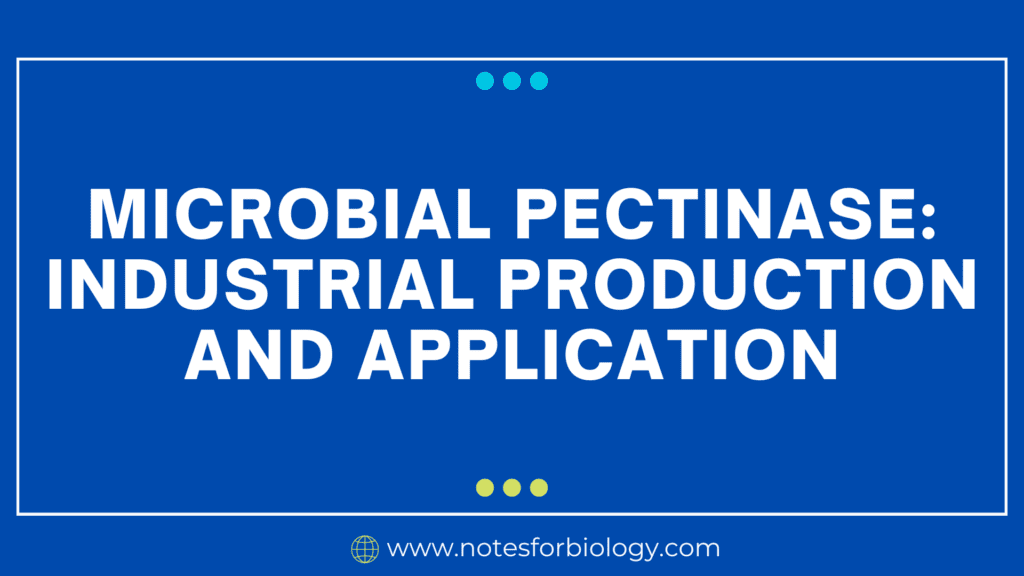Pectinase, a group of enzymes that degrade pectin, is a valuable biocatalyst with diverse applications in various industries. Microbial pectinase, produced by microorganisms, is the primary source for commercial production due to its cost-effectiveness and specific properties.
Table of Contents
What is Pectinase?
Pectinase is a powerful enzyme, mostly produced by microbes, that breaks down pectin, a complex carbohydrate found in plant cell walls. It’s like a tiny pair of scissors that cuts pectin apart, making it useful in various industries.
How is it Made?
It is made by growing certain microorganisms, like fungi or bacteria, in a controlled environment. These microbes are fed with specific nutrients and conditions that encourage them to produce large amounts of pectinase. The enzyme is then extracted and purified for industrial use.
Why Microbial Pectinase?
It offers several advantages over plant-derived enzymes:
Higher yield: Microbial cultures can produce large amounts of pectinase efficiently.
Cost-effective: Microorganisms are relatively inexpensive to cultivate.
Controlled production: The production environment allows for precise control over factors like temperature and pH, ensuring high-quality enzymes.
Production of Microbial Pectinase
Microbial Sources
Fungal Sources: Aspergillus niger, Penicillium species, Rhizopus species are commonly used due to their ability to produce high levels of pectinase.
Bacterial Sources: Bacillus species, Erwinia species, Clostridium species are also employed for pectinase production.
Production Methods
Submerged Fermentation: The most common method involves growing microorganisms in a liquid medium with controlled parameters like temperature, pH, and aeration.
Solid-State Fermentation: Utilizes solid substrates like agricultural residues for microbial growth, offering benefits like lower production costs and reduced waste.
Optimization
Media Optimization: Optimizing the composition of the growth media is crucial for maximizing enzyme production. This includes selecting suitable carbon and nitrogen sources, pH, temperature, and other factors.
Strain Improvement: Genetic modification and mutagenesis techniques can be employed to enhance pectinase production in microorganisms.
Industrial Applications of Microbial Pectinase
Food Industry
Juice Clarification: Pectinase breaks down pectin in fruit juices, leading to improved clarity and filtration efficiency.
Fruit Processing: Increases yield and quality of fruit products like jams, jellies, and concentrates by reducing viscosity and facilitating extraction.
Winemaking: Improves wine quality by degrading pectin, resulting in better color extraction, increased clarity, and improved filtration.
Textile Industry
Degumming: Pectinase is used to remove pectin from natural fibers like flax and hemp, improving their properties for textile production.
Agricultural Industry
Feed Additives: Pectinase enhances the digestibility of plant-based animal feed, leading to better nutrient absorption and growth.
Fruit Ripening: Pectinase can accelerate fruit ripening by degrading pectin in cell walls.
Pharmaceutical Industry
Drug Extraction: Pectinase is used in the extraction of pharmaceutical compounds from plant sources.
Other Applications
Bioremediation: Pectinase can be employed in the breakdown of pectin-rich waste, contributing to environmental cleanup.
Paper Industry: Pectinase can be used in the production of paper, leading to improved pulp quality and reduced energy consumption.
Advantages of Microbial Pectinase
Specificity: Microbial pectinases can be engineered to possess specific properties for different applications.
Biodegradability: Microbial pectinases are environmentally friendly and biodegrade readily.
Cost-Effectiveness: Production methods are relatively inexpensive compared to conventional chemical processes.
High Activity: Microbial pectinases exhibit high activity levels, leading to efficient processes.
Future Perspectives
Strain Engineering: Further genetic modifications and enzyme engineering are expected to enhance enzyme properties and optimize production.
Application Expansion: New applications of pectinase are being explored in various sectors, including biotechnology and biomedicine.
Sustainable Production: Developing sustainable and eco-friendly production methods for microbial pectinase is a priority.
Conclusion
It is a versatile biocatalyst with significant applications in various industries. Its production and utilization are continuously evolving, offering new possibilities for economic development and sustainability.
Frequently Asked Questions(FAQ)
What is Microbial Pectinase?
Pectinase, a group of enzymes that degrade pectin, is a valuable biocatalyst with diverse applications in various industries. Microbial pectinase, produced by microorganisms, is the primary source for commercial production due to its cost-effectiveness and specific properties.
How is Microbial Pectinase?
It is made by growing certain microorganisms, like fungi or bacteria, in a controlled environment. These microbes are fed with specific nutrients and conditions that encourage them to produce large amounts of pectinase. The enzyme is then extracted and purified for industrial use.
Related Articles

